Veneers are a popular cosmetic dental treatment that can transform your smile. They are thin, custom-made shells that cover the front surface of your teeth. Veneers are designed to be durable and long-lasting, but proper care is essential to maintain their appearance and prevent damage. One question that often arises is, can you brush veneers once a day? In this article, we’ll explore the answer to this question and provide you with everything you need to know about taking care of your veneers.
Table of Contents
Understanding Veneers
Before we dive into the question of brushing veneers, it’s important to understand what veneers are and how they work. Veneers are made from either porcelain or composite resin material and are custom-crafted to fit your teeth. They are bonded to the front surface of your teeth to improve their appearance and cover imperfections such as stains, chips, or gaps.
Veneers are a permanent dental solution and can last up to 15 years or longer with proper care. They are stain-resistant and durable but can still be damaged by excessive force or improper care.
Why Brushing Veneers is Important
Maintaining good oral hygiene is essential to keep your veneers looking their best. Brushing your teeth and veneers twice a day is recommended to remove plaque, bacteria, and food particles that can build up on your teeth and gums. This buildup can lead to tooth decay, gum disease, and other dental problems that can compromise the health of your teeth and gums.
Brushing your veneers also helps prevent staining. Although veneers are designed to be stain-resistant, they can still become discolored over time if not properly cared for. Brushing your teeth and veneers twice a day can help prevent staining and keep your veneers looking bright and white.
Can You Brush Veneers Once a Day?
The short answer to this question is yes, you can brush veneers once a day. However, it’s recommended that you brush your teeth and veneers twice a day for optimal oral health and veneer care. Brushing twice a day ensures that you remove any plaque, bacteria, or food particles that can cause tooth decay, gum disease, or other dental problems.
When brushing your veneers, it’s important to use a soft-bristled toothbrush and non-abrasive toothpaste. Avoid using whitening toothpaste or abrasive products that can scratch or damage the surface of your veneers. Gently brush your teeth and veneers in a circular motion for two minutes, then rinse with water.
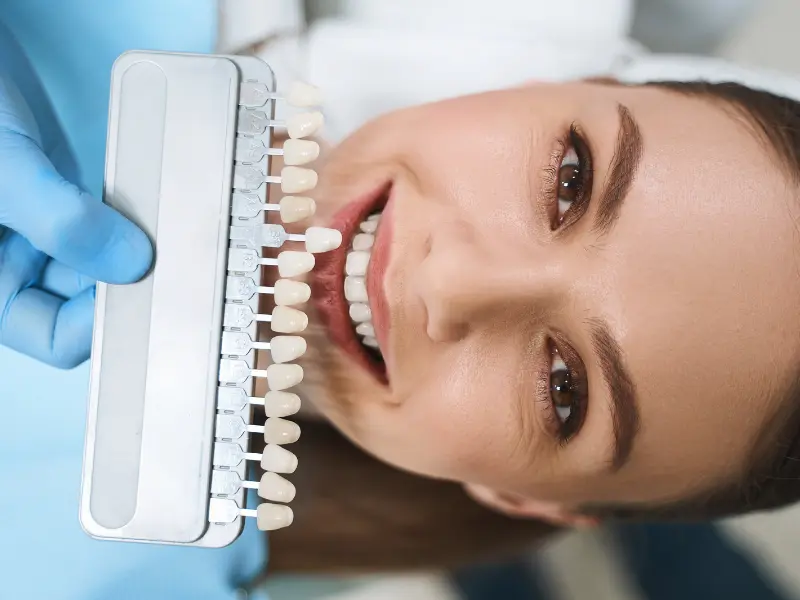
Other Tips for Caring for Veneers
In addition to brushing your veneers twice a day, there are other steps you can take to care for your veneers and maintain their appearance:
1. Floss daily
Flossing is essential to remove plaque and food particles from between your teeth and under the gumline. Use a floss threader to gently clean around your veneers, being careful not to pull or dislodge them.
2. Avoid hard, crunchy foods
Veneers are durable, but they can still be damaged by excessive force. Avoid biting down on hard, crunchy foods like ice, popcorn kernels, or hard candy.
3. Wear a mouthguard
If you participate in sports or grind your teeth at night, wearing a custom-fit mouthguard can protect your veneers from damage.
4. Visit your dentist regularly
Regular dental check-ups and cleanings are essential to maintain the health of your teeth and gums. Your dentist can also check the condition of your veneers and recommend any necessary repairs or replacements.
Can You Brush Veneers Once a Day? New Insights and Perspectives
While brushing your veneers twice a day is crucial, there are a few other things you can do to maintain your oral health and extend the life of your veneers. For example, chewing sugar-free gum after meals can help remove food particles and stimulate saliva production, which can help neutralize acids that can damage your teeth and veneers. Additionally, using an antimicrobial mouthwash can help kill bacteria and freshen your breath, which can be particularly helpful if you have bad breath or are prone to gum disease.
Another important factor to consider when caring for your veneers is your diet. Foods and drinks that are high in sugar or acid can erode your tooth enamel and damage your Veneers over time. Some common culprits include soda, sports drinks, fruit juice, candy, and baked goods. To protect your veneers, try to limit your consumption of these foods and drinks, and opt instead for a balanced diet that includes plenty of fruits, vegetables, lean protein, and whole grains.
By incorporating these tips into your daily routine, you can ensure that your veneers stay strong, healthy, and beautiful for years to come. Remember to brush and floss twice a day, chew sugar-free gum, use an antimicrobial mouthwash, and eat a balanced diet. With proper care and maintenance, your veneers can continue to enhance your smile and boost your confidence for many years to come.
Check This Out! Dental Implants in Turkey: Cost, Benefits, and Everything You Need to Know
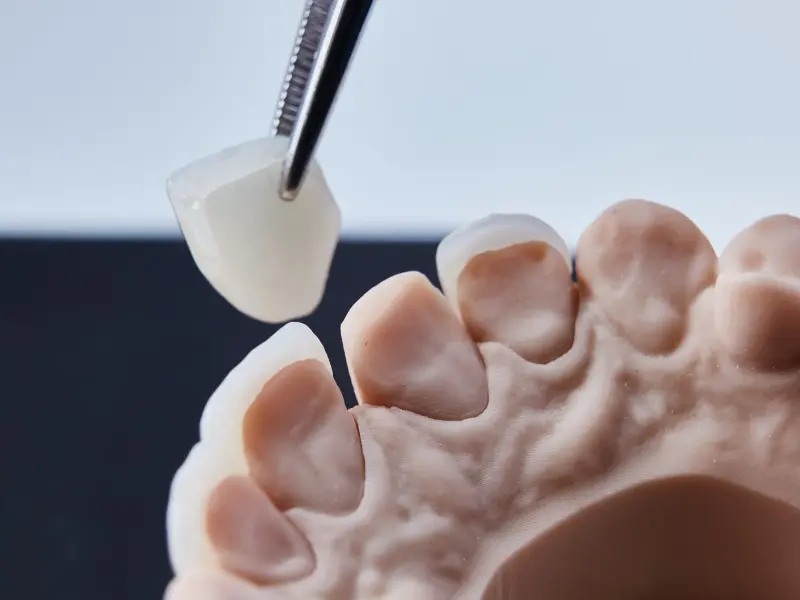
The Importance of Proper Brushing Technique
While brushing twice a day is essential for maintaining the health of your veneers, it’s equally important to use proper brushing technique. Brushing your teeth and veneers too hard or using an abrasive toothpaste can damage the surface of your veneers and make them more susceptible to staining, decay, and other dental problems. To avoid this, use a soft-bristled toothbrush and a gentle circular motion when brushing your teeth and veneers.
In addition to using proper technique, it’s also important to brush for a full two minutes each time. This may not seem like a long time, but it’s enough to remove plaque, bacteria, and food particles that can cause dental problems and compromise the appearance of your veneers. To help you keep track of time, consider setting a timer or using a toothbrush with a built-in timer or pressure sensor.
With these tips in mind, you can ensure that you’re brushing your veneers properly and maintaining optimal oral health. Remember to brush twice a day with a soft-bristled toothbrush and non-abrasive toothpaste, use proper technique, and brush for a full two minutes each time. By taking these steps, you can keep your veneers strong, healthy, and beautiful for years to come.
Using the Right Toothpaste for Your Veneers
When it comes to brushing your veneers, the type of toothpaste you use can make a big difference in their longevity and appearance. Some toothpaste brands contain abrasive particles or chemicals that can scratch the surface of your veneers and make them more prone to staining and damage. To avoid this, look for a toothpaste that is specifically formulated for veneers or for sensitive teeth.
Many toothpaste brands now offer formulations that are gentle on teeth and veneers, without sacrificing their cleaning power. These toothpastes often contain ingredients like fluoride, which helps strengthen teeth and prevent decay, and baking soda, which can help remove surface stains and freshen your breath. If you’re not sure which toothpaste is best for your veneers, ask your dentist for recommendations.
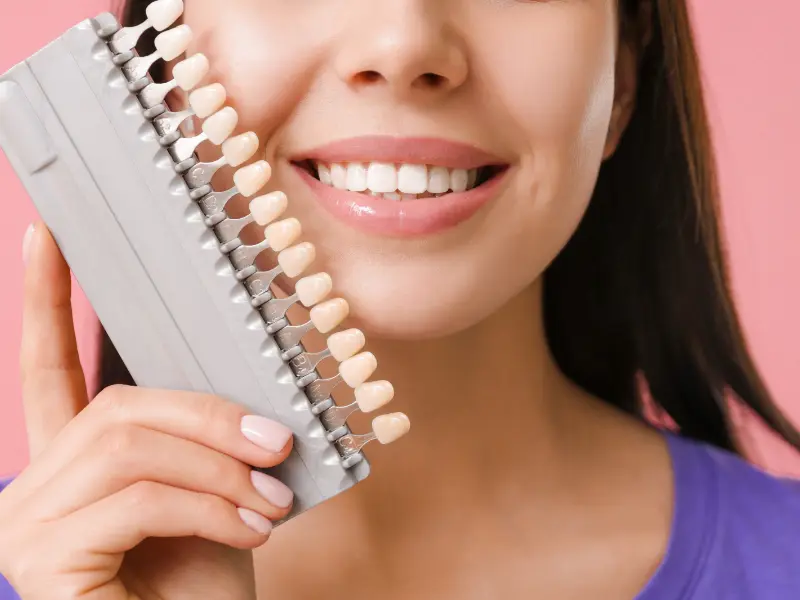
What to Do If You Experience Sensitivity
While veneers are designed to be durable and long-lasting, they can sometimes cause sensitivity or discomfort, especially in the first few weeks after they are placed. This is because the process of preparing your teeth for veneers can sometimes expose the underlying dentin, which can be sensitive to temperature changes and pressure.
If you experience sensitivity after getting veneers, don’t panic. This is a common side effect and usually subsides on its own within a few weeks. In the meantime, you can try using toothpaste for sensitive teeth or applying desensitizing gel to your teeth and veneers. If the sensitivity persists or becomes unbearable, contact your dentist for further evaluation and treatment options. In some cases, a minor adjustment to your veneers may be needed to alleviate discomfort.
Check This Out! Teeth Whitening Istanbul Cost: How to Get a Brighter Smile on a Budget
Conclusion of can you brush veneers once a day
Brushing your veneers once a day is better than not brushing, but it’s recommended that you brush your teeth and veneers twice a day for optimal oral health and veneer care. By brushing twice, a day, you can remove any plaque, bacteria, or food particles that can cause dental problems and ensure your veneers remain bright and white.
It’s also important to use a soft-bristled toothbrush and non-abrasive toothpaste when brushing your veneers. Avoid using whitening toothpaste or abrasive products that can scratch or damage the surface of your veneers. When brushing, be sure to brush your teeth and veneers in a circular motion for two minutes, then rinse with water.
In addition to brushing and flossing, there are other steps you can take to care of your veneers. Avoid hard, crunchy foods that can damage your veneers, and consider wearing a custom-fit mouthguard if you participate in sports or grind your teeth at night. Regular dental check-ups and cleanings are also important to maintain the health of your teeth and gums and to check the condition of your veneers.
In summary, brushing your veneers once a day is better than not brushing at all, it’s recommended that you brush your teeth and veneers twice a day for optimal oral health and veneer care. By following these tips and taking proper care of your veneers, you can maintain their appearance and enjoy your new smile for years to come.
FAQs about can you brush veneers once a day
- Can veneers be damaged by brushing too hard and can you brush veneers once a day?
Yes, brushing your veneers too hard or with an abrasive toothpaste can scratch or damage their surface. It’s important to use a soft-bristled toothbrush and non-abrasive toothpaste when brushing your veneers.
- How often should I visit the dentist after getting veneers?
It’s recommended that you visit the dentist every six months for a routine check-up and cleaning. Your dentist can check the condition of your veneers and recommend any necessary repairs or replacements.
- Do veneers require special care?
Veneers require the same care as your natural teeth, including brushing twice a day, flossing daily, and avoiding hard, crunchy foods that can damage them.
- Can veneers stain over time?
While veneers are designed to be stain-resistant, they can still become discolored over time if not properly cared for. Brushing your teeth and veneers twice a day can help prevent staining and keep your veneers looking bright and white.
- How long do veneers typically last?
Veneers can last up to 15 years or longer with proper care. However, their lifespan can be affected by factors such as your oral hygiene habits, diet, and any teeth grinding or clenching habits you may have.

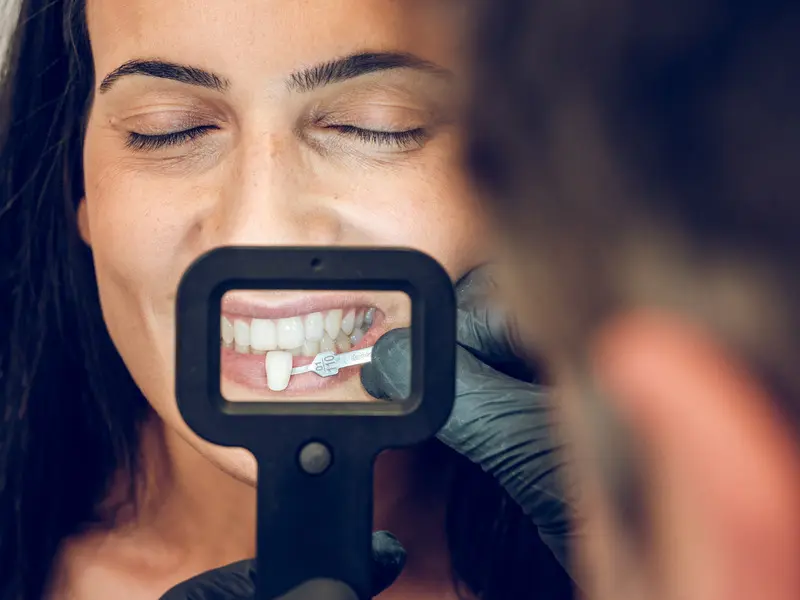
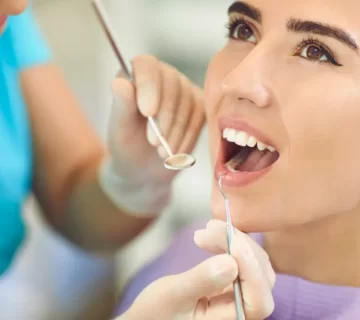


No comment